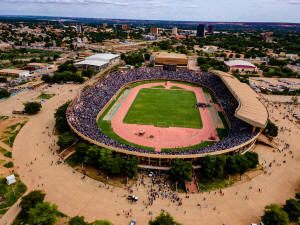West African leaders begin talks on Niger as junta stands firm
 Send a link to a friend
Send a link to a friend
 [August 10, 2023]
By Boureima Balima and Abdel-Kader Mazou [August 10, 2023]
By Boureima Balima and Abdel-Kader Mazou
NIAMEY/ABUJA (Reuters) -West African heads of state discussed their
response to last month's military takeover in Niger at closed-door talks
in Nigeria on Thursday after the junta defied their earlier threat to
use force to restore democracy.
The meeting is taking place hours after Niger's coup leaders named a new
government, forcing their agenda before the summit.
Since the July 26 power grab, the junta has rebuffed diplomatic
overtures and ignored an Aug. 6 deadline from the Economic Community of
West African States (ECOWAS) to reinstate ousted president Mohamed
Bazoum.
Mahamane Roufai Laouali, cited as "Secretary General of the Government",
named 21 ministers on state television overnight without specifying any
further government plans.
Three leaders of the military takeover were named ministers of defence,
interior and sports.
Former Finance Minister Ali Mahamane Lamine Zeine, who had been named
prime minister on Monday, was appointed finance minister for the new
government. Niger's previous government had 43 ministers and none were
military officers.

U.N. Secretary-General Antonio Guterres voiced concern about Bazoum and
his family after his party reported that they were being detained at the
presidential residence without electricity or running water, and had
gone days without fresh food.
"The Secretary-General... once again calls for his immediate,
unconditional release and his reinstatement as Head of State," a U.N.
spokesperson said on Wednesday.
The meeting in the Nigerian capital, Abuja, could prove a pivotal moment
in the standoff. The bloc's leaders are expected to agree on next steps,
which could include military intervention - something an ECOWAS official
has said would be a last resort.
MIXED FEELINGS
In nearby Senegal, where the government has said it could send troops if
needed, people's views about a military intervention differed.
"As long as we act to restore peace I'm a supporter," Lansanna Diedhiou
said near a weekly market in the capital Dakar. "The objective of the
organization is ... to act together for the African family."
Others, like Cheikh Niang, were concerned about the impact on regional
ties and solidarity.
"We're all Africans and Niger is part of the African continent," he
said. "We can't send Africans to wage war against each other."
Envoys of the Nigerian president and ECOWAS chair Bola Tinubu met coup
leaders in the capital, Niamey, on Wednesday, offering a glimmer of hope
for dialogue after previous missions were spurned.
[to top of second column]
|

General view as supporters of Niger's
coup leaders take part in a rally at a stadium in Niamey, Niger,
August 6, 2023. REUTERS/Mahamadou Hamidou/File Photo

Any escalation would further destabilise West Africa's Sahel region,
one of the world' poorest, where a long-running Islamist insurgency
that spread from Mali has displaced millions over the past decade
and stoked a hunger crisis.
Niger had recently fared better than its neighbours Mali and Burkina
Faso in stemming the violence. It also became an increasingly
important Western ally for fighting insurgents after juntas seized
power in the other two countries between 2020 and 2022 and cut ties
with traditional partners.
DIFFERENT CONTEXTS
The coup was triggered by internal politics but it has evolved into
an international entanglement, with ECOWAS, the United Nations and
Western countries putting pressure on the junta to stand down, while
military governments in neighbouring Mali and Burkina Faso have
vowed to defend it.
In Burkina Faso's capital Ouagadougou, resident Issouf Ouedraogo
felt it made no sense for his country's new leaders to support the
Niger coup because the contexts were different.
"Burkina was in a situation of degradation and acute insecurity," he
said in reference to the frustrations that stoked two coups there
last year.
"Niger, on the other hand, was in a stable situation," he noted.
The military takeover has raised questions over whether the United
States can continue the 1,100-strong military presence in Niger that
officials and analysts say has been key to fighting Islamist
militants in the Sahel region.

A complicating factor could be any decision by Niger's coup leaders
to follow Mali's footsteps and seek help from Russia's Wagner Group,
which the U.S. has designated a transnational criminal organization.
Wagner's chief, Yevgeny Prigozhin, has welcomed the coup in Niger
and said his forces were available to restore order.
Niger accused France on Wednesday of violating its airspace,
attacking a military camp and freeing "terrorists" to undermine the
country. Paris denied the charges.
(Additional reporting by Joel Honore Kouam and Ngouda Dione in
Dakar; Thiam Ndiaga in OuagadougouWriting by Alessandra Prentice and
Sofia Christensen; Editing by Robert Birsel and Philippa Fletcher)
[© 2023 Thomson Reuters. All rights
reserved.]This material may not be published,
broadcast, rewritten or redistributed.
Thompson Reuters is solely responsible for this content. |